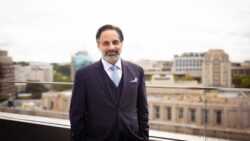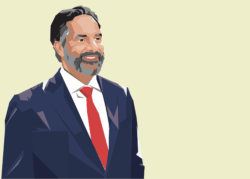Georgetown University announced on Oct. 15 that Eduardo M. Peñalver would be named the institution’s 49th president, after a unanimous vote by the board of directors. In interviews with the Voice, students said they are excited by Peñalver’s Latino identity, progressive views, and commitment to Jesuit values as they look ahead to his tenure.
Peñalver will begin his role on July 1, 2026 after four years as president of Seattle University. The son of a Cuban immigrant, he will become the first non-interim Latino president of Georgetown.
The news of Peñalver’s appointment excited some students with Latine heritage and connections, including Mariah Roque (CAS ’28), who is involved in Ritmo y Sabor, Georgetown’s Latin dance group, and the Georgetown Caribbean Culture Circle.
“As soon as I saw the last name, I was like ‘Oh, thank God. This is representation,’” Roque said. “I think when we look at private universities, this isn’t something that you see normally.”
Roque took particular interest in Peñalver’s honorary member status in Lambda Upsilon Lambda (LUL), a historically Latino fraternity. While Georgetown doesn’t have an LUL chapter on campus, it does have the Latinx affinity house La Casa Latina, which serves a similar purpose of providing community for Latinx students.
La Casa Latina said in a statement to the Voice that they are “excited about the new president sharing an identity” with them and that they “look forward to future collaboration.”
Roque is the house’s Director of Communications and Outreach. She said she is excited to connect with Peñalver and share with him the needs of Georgetown’s Latino community.
“He is the voice that we kind of need during this time, especially in Washington, D.C.,” Roque said, referencing Peñalver’s progressive history.
Peñalver acknowledged how the politics and policies of immigration “hit close to home” for him, at a 2017 Cornell Law event, going on to express his “sympathy and solidarity” to individuals who may be impacted by the potential elimination of Deferred Action for Childhood Arrivals at the time. In 2023, Peñalver co-wrote an article arguing that affirmative action is a core part of a Jesuit education. Earlier this year, he wrote a letter against bans on transgender service in the military and discrimination against LGBTQ+ individuals.
In an interview with The Washington Post, Georgetown’s Presidential Search Committee Chair Kevin Warren (MSB ’84) said that amid a challenging environment for higher education institutions, it was important that the next president was strongly committed to the university’s Jesuit values, including welcoming international students.
Like Roque, Olivia Mason (CAS ’26) is looking forward to Peñalver’s apparent “pro-protecting immigrant students” stance. She sees this outlook as especially important given the current political climate in D.C., including crackdowns by immigration enforcement officials and President Donald Trump’s deployment of the National Guard.
Mason also emphasized that she hopes Peñalver’s appointment means an opportunity to further strengthen the relationship between GUSA and administration. Mason previously served as a GUSA senator before moving to an executive role in the Henshaw-Wagner administration.
GUSA is most productive when it has a strong relationship with the university’s administration, Mason said.
“The decisions GUSA makes aren’t binding. We rely on the school’s administration to be able to enact the things that we want as the student body,” Mason said. “When we have a president that is in alignment with what the senators and student body are looking for, it makes our jobs as student representatives much easier.”
As GUSA’s director of Capitol Campus affairs, Mason also hopes that Peñalver will engage with students at the Capitol Campus and work to integrate that community with their counterparts on the main campus. Peñalver told The Washington Post that he wants to expand Georgetown’s investment in its Capitol Campus.
He also plans to bring to Georgetown his experiences leading the Jesuit Seattle University—where he described his vision as “progressive, Jesuit and Catholic,” according to The Spectator, its student newspaper.
For some Catholic students, that continued commitment to Jesuit and Catholic values was particularly important in a new university leader, especially another lay president. Lukas Pitman (SFS ’27) is involved in Campus Ministry and Catholic Ministry, working as a student sacristan and a retreat leader.
“When it comes to the decision, I think they came to the right one,” Pitman said. “Regardless of whether or not he’s a Jesuit, I still think that he, from what I’ve seen, is looking to uphold Georgetown’s Catholic identity, and specifically some of the different tenants of Jesuit core values.”
Pitman was surprised that a decision was reached before next year.
“They had so many more months to make this decision, and yet the candidate maybe just spoke out as just perfect for that role,” Pitman said.
Reflecting on his expectations for Peñalver, Pitman praised President Emeritus John J. DeGioia (CAS ’79, GRAD ’95), who was Georgetown’s first lay president, for his commitment to interfaith dialogue.
“What Jack DeGioia did here at Georgetown was he was very much a figurehead of bringing all the different faiths together,’” Pitman said, adding that DeGioia did this while keeping the school true to its Jesuit Catholic identity.
Pitman hopes Georgetown’s new president will draw on the work of his predecessor, whom Pitman said dedicated his career to the school and acted as a unifying force on campus.
“I hope that Peñalver recognizes the work that Jack DeGioia did and continues that legacy here at Georgetown,” Pitman said.






